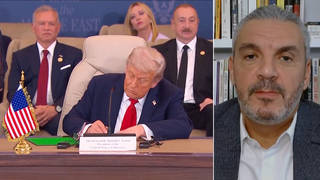
Topics
Guests
- Mike Gravelformer U.S. senator for Alaska from 1969-81. He is best known for his release of the Pentagon Papers into the public record. As a junior senator in 1971, Gravel insisted the public had a right to know the truth behind the Vietnam War. He then read more than 4,000 pages of the 7,000-page document into the Senate record.
On the Senate floor last week, outgoing Democratic Sen. Mark Udall called for a purge of top CIA officials implicated in the torture program and cover-up, including current Director John Brennan. But as he enters the final days of his Senate term, Udall is facing calls to take action of his own. The Senate findings released last week amount to only a fraction of the full report — 480 heavily redacted pages out of more than 6,000 pages total. The White House has blocked the report’s full release in deference to the CIA’s wishes. That’s sparked demands that Udall invoke a rarely used congressional privilege and make the report public. There is precedent for him to follow: In 1971, then-Alaska Senator Mike Gravel entered more than 4,000 pages of the 7,000-page Pentagon Papers into the Senate record, insisting the public had a right to know the truth behind the Vietnam War. More than four decades later, Gravel joins us to talk about his historic action and why he is now calling on Udall to follow in his footsteps with the full Senate report on CIA torture.
Transcript
AMY GOODMAN: Graphic new details of the post-9/11 U.S. torture program came to light earlier this month when the Senate Intelligence Committee released a 500-page summary of its investigation into the CIA. The Senate report details a list of torture methods used on prisoners—waterboarding, sexual threats with broomsticks, medically unnecessary rectal feeding. In one case, a prisoner had his entire lunch tray of hummus, pasta and nuts puréed and administered by enema. Prisoners were threatened with buzzing power drills. Some prisoners were deprived of sleep for up to 180 hours and at times had their hands shackled above their heads.
On the Senate floor, outgoing Democratic Senator Mark Udall called for a purge of top CIA officials implicated in the torture program and cover-up, including current CIA Director John Brennan. In stark language, Udall accused the CIA of lying.
SEN. MARK UDALL: The CIA has lied to its overseers in the public, destroyed and tried to hold back evidence, spied on the Senate, made false charges against our staff, and lied about torture and the results of torture. And no one has been held to account. … There are right now people serving in high-level positions at the agency who approved, directed or committed acts related to the CIA’s detention and interrogation program. It’s bad enough not to prosecute these officials, but to reward or promote them and risk the integrity of the U.S. government to protect them is incomprehensible. The president needs to purge his administration of high-level officials who were instrumental to the development and running of this program.
AMY GOODMAN: As outgoing Senator Mark Udall urges President Obama to fire John Brennan, Udall himself faces calls to take action of his own. The Senate findings amount to only a fraction of the full report—480 heavily redacted pages out of more than 6,000 pages in total. The White House has blocked release of the full report so far, backing the CIA’s wishes. That’s sparked demands that Udall invoke a rarely used congressional privilege and make the report public. Using the absolute free speech rights for members of Congress, the Colorado senator could read the torture report into the Congressional Record. And with his term about to expire after losing re-election, Senator Udall has not ruled that out, saying he’ll, quote, “keep all options on the table.”
There’s a precedent for Senator Udall to enter the torture report into the public record. In 1971, after The New York Times published portions of the Pentagon Papers, the secret history of U.S. involvement in the Vietnam War, the Nixon administration tried to block the release of further details. But a junior senator from Alaska named Mike Gravel insisted the public had a right to know the truth behind the war. He then put more than 4,000 pages of the 7,000-page document into the Senate record. Senator Gravel spoke to the media at the time, in 1971, about his decision.
SEN. MIKE GRAVEL: When I came into possession of these papers, I looked around, and nobody in government had done anything. The only thing that was being done in government was an effort to stifle and hide this stuff. And it just dawned on me that somebody—if we’re going to have any faith at all in our institutions, somebody from government’s got to be—got to have the same resolve, the same feelings for stopping the killing as Ellsberg did, as the Post did, as The New York Times did, as the St. Louis Post-Dispatch, as all these…
Not only myself, because the people who released this were bureaucrats. They’re all bureaucrats, the people that we disparage so often. They weren’t elected officials, they were bureaucrats. And they had much less risk than I have. The risk that I have is being expulsed from the Senate.
AMY GOODMAN: Well, today, four decades later, former senator and former presidential candidate, Mike Gravel, is among those calling on Colorado Senator Mark Udall to follow in his footsteps and enter the full Senate report on CIA torture into the Congressional Record.
Last week, Democracy Now!'s Aaron Maté and I interviewed Senator Gravel. I began by asking him to outline what he's urging Senator Udall to do.
MIKE GRAVEL: Well, he may have the opportunity getting his hands on the full report. He doesn’t have to read it into the Senate record. It’s already in the Senate record, because it’s the record of a committee. So you don’t have to duplicate that. What he has to do is exercise the speech and debate clause, take this record of 6,000 pages, put a press release describing why he’s doing it, and release it to the public. It’s that simple.
Most members of Congress, unfortunately, don’t fully understand that there’s three functions that representatives have to perform. One is to inform the public. Two is to legislate. And three is to have oversight. And so, what we have with the release of this document, or the summary, was an oversight. This is—they conducted oversight, and they released it to the public. Madison, Jefferson, James Wilson, George Washington all felt—all felt the most important function of representation was to inform the people as to what their government is doing. And so, this is all that the Feinstein committee has done thus far, but we need to see the entire record so that it could be probed.
AMY GOODMAN: Senator Gravel, have you spoken to Mark Udall?
MIKE GRAVEL: No, I haven’t. I had a situation earlier this year where Senator Wyden was going to call me, and, of course, he didn’t. And it was on this subject. And so, I felt—
AMY GOODMAN: In fact, it doesn’t just have to be Udall. You’re saying Udall, as he’s the outgoing senator. But why not, for example, Senator Wyden?
MIKE GRAVEL: Yeah, there’s no risk at all. There’s not even political risk, because he’s stated on the floor, and privately, that he would like to spend a major portion of his time out of office going after this secrecy problem and going after torture and revealing that. Well, the best way to do that right now is to reveal the entire study before January. In that way, he can mine that, and so can scholars and reporters mine it throughout. Keep in mind that Snowden made moot the issue of members of the Intelligence Committee releasing what the NSA was doing. But they knew it. They talked about it internally. But they never said anything about it publicly. And the only thing that binds them is peer pressure. Now, when the Republicans say they’re going to stop them, they can’t—unless you could physically assault them, they can’t stop them.
But the key is to get the document and hand it out to the public. He’s got the right to do this under the Constitution of the United States, which has been sustained. That action has been sustained by the unanimous agreement of the Supreme Court of the United States. And so, that’s the Constitution, case law of the Supreme Court. There’s no risk in doing this. But there’s also much to be gained from it, because then we can begin to hold elements of our government accountable for the unbelievable debasement of our morality.
AMY GOODMAN: That’s former Senator Mike Gravel speaking on Democracy Now!












Media Options